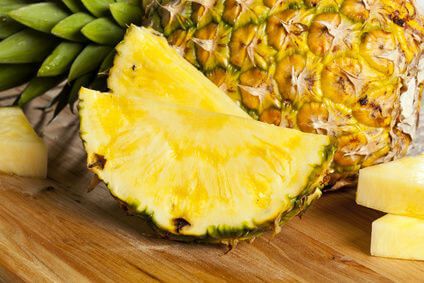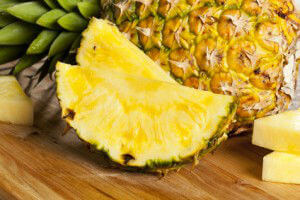
Pineapple (Ananas comosus), is a member of the Bromeliaceae family, which one of its most potent health-promoting compounds, the enzyme bromelain, is named after. Pina is the name that the Spanish give to the pineapple, which is the root of its English name which reflects its visual similarity to the pinecone.
Pineapples were first discovered by Europeans in 1432 on the Caribbean island we now know as Guadalupe. By the end of the 16th century, this tropical delight was introduced by Portuguese and Spanish explorers to Asian, African and South Pacific colonies where they are still grown today.
Because of their perishable nature, pineapples were considered a luxury item by early American colonists who used the pineapple for decoration, medicine and as a sweet treat.
It was not until the 18th century that pineapples were cultivated in Hawaii. They are also commercially grown in Thailand, the Philippines, China, Brazil and Mexico.
The health promoting capabilities of this fruit are vast and research continues to yield a variety of ways that this delicious fruit is beneficial.
Pineapple is Loaded with Vitamin C
You will get 131 percent of the recommended vitamin C value in each 165-gram serving of pineapple. Vitamin C is a potent antioxidant that can help prevent free radical compounds from damaging DNA. According to the University of Maryland Medical Center, vitamin C’s powerful antioxidant capability may slow the development of atherosclerosis and reduce the risk of high blood pressure.
Other Nutrients
Along with vitamin C, pineapple is a great source of vitamins B1, B6, folate, copper and dietary fiber.
What is Bromelain?
Bromelain is a protein-digesting enzyme extract that is found in the core of the plant but is often wasted. It is an amazing compound that has been found to have a number of potential medicinal applications including:
- treating cancer tumors
- treating asthma
- treating osteoarthritis in the knee
- treating skin cancer
- treating sinusitis
- treating colitis
Like all natural substances, the benefits of whole pineapple cannot be reduced to one constituent. The whole is always more than the sum of its parts, and pineapple is no exception.
Other Medicinal Benefits of Pineapple
Anti-diabetic properties: The leaf extract has been found to have insulin sensitizing and anti-diabetic properties. This shows promise for a natural substance to handle insulin sensitivity.
Deactivation of rotavirus transmission: Pineapple juice has a very low pH and other properties in the juice have been found to inactivate rotavirus where honeydew and papaya juice have failed.
Natural Reduction in Cholesterol: Research indicates that pineapple leaves have a similar impact on blood lipids as statin drugs without the side effects.
Boost Melatonin: Recognized as one of the richest sources of dietary melatonin (exceeding bananas and oranges), pineapple causes blood level to peak two hours after eaten.
 Pineapple Tips
Pineapple Tips
- Choose only fresh, organic pineapples when possible. Don’t purchase canned pineapple, especially if it is in syrup. Fresh frozen is also a good choice, especially for smoothies.
- Purchase a fresh pineapple and juice it yourself or purchase raw, organic juice.
- Pineapple is a great addition to fruit salads along with papaya, kiwi and mango.
- Try grilling fresh pineapple along with peppers and onions for a flavorful meal.
-The Alternative Daily
Sources:
http://www.ncbi.nlm.nih.gov/pubmed/17893836
http://www.ncbi.nlm.nih.gov/pubmed/18317550
http://www.ncbi.nlm.nih.gov/pubmed/12587686
http://www.ncbi.nlm.nih.gov/pubmed/15796206
http://www.ncbi.nlm.nih.gov/pubmed/20848493

